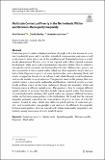Multiscale contextual poverty in the Netherlands : within and between-municipality inequality
Abstract
Contextual poverty refers to high proportions of people with a low income in a certain (residential) space, and it can affect individual socioeconomic outcomes as well as decisions to move into or out of the neighbourhood. Contextual poverty is a multiscale phenomenon: Poverty levels at the regional scale reflect regional economic development, while meso-scale concentrations of poverty within cities are related to city-specific social, economic and housing characteristics. Within cities, poverty can also concentrate at micro spatial scales, which are often neglected, largely due to a lack of data. Exposure to poverty at lower spatial scales, such as housing blocks and streets, is important because it can influence individuals through social mechanisms such as role models or social networks. This paper is based on the premise that sociospatial context is necessarily multiscalar,and therefore contextual poverty is a multiscale problem which can be better understood through the inequality within and between places at different spatial scales. The question is how to compare different spatial contexts if we know that they include various spatial scales. Our measure of contextual poverty embraces 101spatial scales and compares different locations within and between municipalities in the Netherlands. We found that the national inequality primarily came from the concentrations of poverty in areas of a few kilometres, located in cities, which have different spatial patterns of contextual poverty, such as multicentre, core-periphery and east-west. In addition to the inequality between municipalities, there are considerable within-municipality inequalities, particularly among micro-areas of a few hundred metres.
Citation
Petrović , A , Manley , D & van Ham , M 2021 , ' Multiscale contextual poverty in the Netherlands : within and between-municipality inequality ' , Applied Spatial Analysis and Policy , vol. First Online . https://doi.org/10.1007/s12061-021-09394-3
Publication
Applied Spatial Analysis and Policy
Status
Peer reviewed
ISSN
1874-463XType
Journal article
Description
Funding: This study was funded by the European Research Council under the European Union's Seventh Framework Programme (FP/2007-2013) / ERC Grant Agreement n. 615159 (ERC Consolidator Grant DEPRIVEDHOODS, Socio-spatial inequality, deprived neighbourhoods, and neighbourhood effects).Collections
Items in the St Andrews Research Repository are protected by copyright, with all rights reserved, unless otherwise indicated.
Related items
Showing items related by title, author, creator and subject.
-
Strength in a weakened state : interpreting Hizb’allah’s experiences as a social movement and governing coalition in Lebanon 1985-2013
Bernhoff, Arthur (University of St Andrews, 2015-06-23) - ThesisThis study investigates Hizb’allah’s successful but competing dual development as an extra-institutional Shi’a social movement and an institutional political party. Hizb’allah has traditionally been studied from the ... -
Radical social innovations and the spatialities of grassroots activism : navigating pathways for tackling inequality and reinventing the commons
Apostolopoulou, Elia; Bormpoudakis, Dimitrios; Chatzipavlidis, Alexandros; Cortés Vázquez, Juan José; Florea, Ioana; Gearey, Mary; Levy, Julyan; Loginova, Julia; Ordner, James; Partridge, Tristan; Pizarro Choy, Alejandra; Rhoades, Hannibal; Symons, Kate; Veríssimo, Céline; Wahby, Noura (2022-04-05) - Journal articleIn this article, by drawing on empirical evidence from twelve case studies from nine countries from across the Global South and North, we ask how radical grassroots social innovations that are part of social movements and ... -
Wellbeing and social network characteristics in rural communities : findings from a cohort in social housing in Cornwall, United Kingdom
Long, Emily; Stevens, Sebastian; Topciu, Raluca; Williams, Andrew James; Taylor, Timothy; Morrissey, Karyn (2022-05-19) - Journal articleBackground: The mental wellbeing of those living in resource poor and rural localities is a public health priority. Despite evidence of a link between social networks and mental wellbeing, little is known about this ...

